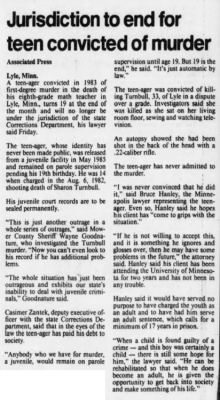Jurisdiction to end for teen convicted of murder
Jurisdiction to end for teen convicted of murder
Lyle, Minn.
A teen-ager convicted in 1983 of first-degree murder in the death of his eighth-grade math teacher in Lyle, Minn., turns 19 at the end of the month and will no longer be under the jurisdiction of the state Corrections Department, his lawyer said Friday.
The teen-ager, whose identity has never been made public, was released form a juvenile facility in May 1985 and remained on parole supervision pending his 19th birthday. He was 14 when charged in the Aug. 6, 1982 shooting death of Sharon Turnbull.
His juvenile court records are to be sealed permanently.
"This is just another outrage in a whole series of outrages," said Mower County Sheriff Wayne Goodnature, who investigated the Turnbull murder, "Now you can't even look to his record if he has additional problems.
"The whole situation has just been outrageous and exhibits our state's inability to deal with juvenile criminals," Goodnature said.
Casimer Zantek, deputy executive officer with the state Corrections Department, said that in the eyes of the law the teen-ager has paid his debt to society.
"Anybody who we have for murder, a juvenile, would remain on parole supervision until age 19. But 19 is the end," he said. "It's just automatic by law."
The teen-ager was convicted of killing Turnbull, 33, of Lyle in a dispute over a grade. Investigators said she was killed as she sat on her living room floor, sewing and watching television.
An autopsy showed she had been shot in the back of the head with a .22-caliber rifle.
The teen-ager has never admitted to the murder.
"I was never convinced that he did it," said Bruce Hanley, the Minneapolis lawyer representing the teenager. Even so, Hanley said he hopes his client has "come to grips with the situation."
"If he is not willing to accept this, and it is something he ignores and glosses over, then he may have some problems in the future," the attorney said. Hanley said his client has been attending the University of Minnesota for two years and has not been in any trouble.
Hanley said it would have served no purpose to have charged the youth as an adult and to have had him serve an adult sentence, which calls for a minimum of 17 years in prison.
"When a child is found guilty of a crime-- and this boy was certainly a child-- there is still some hope for him," the lawyer said. "He can be rehabilitated so that when he does become an adult, he is given the opportunity to get back into society and make something of his life."


